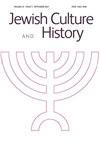Appendix: a symposium on Simon de Montfort, the Jews and the politics of naming
Q4 Arts and Humanities
引用次数: 0
Abstract
Why do we publish a mini-symposium in Jewish Culture and History about Simon de Montfort, Sixth Earl of Leicester, a thirteenth century ‘English’ (actually French) Nobleman? If this was the Journal of Medieval History there would be no need for any such justification, or even the English Historical Review, given the importance of de Montfort in domestic history, and especially that of the evolution of parliament. But in a Jewish studies journal, especially one that prides itself on interdisciplinarity and a deep chronological and geographical range? In terms of the history of English antisemitism, de Montfort would earn his keep for inclusion as an innovator (expelling Jews from a particular town, a precursor for the world first of expulsion from a whole kingdom which happened in 1290), and as someone whose religiously inspired hatred for nonChristians (and some Christians as well), was especially profound. Ideology and power were a murderous mix in his case, one that was exceptional even in thirteenth century England. His antisemitism, however, would not quite perhaps be enough to merit the minisymposium in this journal. There is a wider significance and first it concerns the relationship between history and representation and the growing ‘memory wars’ that are being used to justify racial intolerance and populist extremism in the western world. Slow burning in the case of Leicester, there has been an awareness since at least the early 1990s, that the naming not just of its second university, but his memorial presence in the whole of the city, was problematic and offensive to the local Jewish community and beyond. The summer of 2020, the murder of George Floyd, and the new momentum behind the Black Lives Matter movement, gave a global focus to heritage that commemorated racists of both the distant and recent past. There was a renewed consideration of the naming of De Montfort University, especially from its student union, which believed it was incompatible with the claims to equality and diversity policies made by this higher education institute. An online symposium was organised to discuss the issue. A cynical view would be that the management of the university believed that calling a small event where inevitably views would be complex and competing, would take the sting out of the issue. It would be expensive and messy to rename a university, especially unwelcome at a time of Covid related financial stringency. Readers of the diverse views expressed in this附录:西蒙·德·蒙福特、犹太人和命名政治研讨会
为什么我们要在《犹太文化与历史》上发表一个关于莱斯特第六伯爵西蒙·德·蒙福特的小型研讨会,他是13世纪的“英国”(实际上是法国)贵族?如果这是《中世纪历史杂志》,那么就不需要任何这样的理由,甚至不需要《英国历史评论》,因为德蒙特福特在国内历史中的重要性,尤其是议会的演变。但在一本犹太研究杂志上,尤其是一本以跨学科性和深厚的时间和地理范围而自豪的杂志?就英国反犹太主义的历史而言,德蒙特福特将作为一名创新者(将犹太人驱逐出一个特定的城镇,这是1290年世界上第一次驱逐出整个王国的先驱),以及一个宗教上激发了对非基督徒(以及一些基督徒)的仇恨特别深刻的人,赢得了被包容的机会。在他的案件中,意识形态和权力是一种谋杀性的混合,即使在13世纪的英格兰也是如此。然而,他的反犹太主义可能还不足以在本杂志上获得小型会议的荣誉。还有更广泛的意义,首先它涉及历史和代表性之间的关系,以及西方世界日益增长的“记忆战争”,这些战争被用来为种族不容忍和民粹主义极端主义辩护。以莱斯特为例,至少从20世纪90年代初开始,人们就意识到,不仅为其第二所大学命名,而且为他在整个城市的纪念活动命名,都是有问题的,对当地犹太社区和其他人来说都是冒犯。2020年夏天,乔治·弗洛伊德被谋杀,以及“黑人的命也是命”运动背后的新势头,使全球关注纪念遥远和近代种族主义者的遗产。德蒙特福特大学的命名问题得到了重新考虑,尤其是其学生会,他们认为这与这所高等教育机构对平等和多样性政策的主张不符。组织了一个在线研讨会来讨论这个问题。一种愤世嫉俗的观点是,该大学的管理层认为,举办一场观点不可避免地复杂和相互竞争的小型活动,可以消除问题的刺痛感。重新命名一所大学既昂贵又混乱,在新冠肺炎相关的财政紧缩时期尤其不受欢迎。读者在这篇文章中表达了不同的观点
本文章由计算机程序翻译,如有差异,请以英文原文为准。
求助全文
约1分钟内获得全文
求助全文

 求助内容:
求助内容: 应助结果提醒方式:
应助结果提醒方式:


